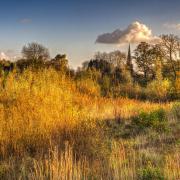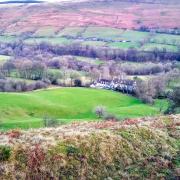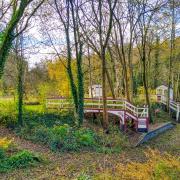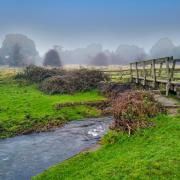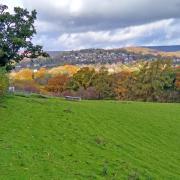Catherine Roth discovers the unique theatre group which calls Chatsworth its home

A talented theatre group has been treading the boards at Chatsworth House for well over a decade. With a reputation for quality drama, the Chatsworth Players describe themselves as an amateur group with professional aspirations.
Chatsworth’s small but elaborately decorated theatre is perfect for staging classics which have included A Christmas Carol, Gaslight, Hobson’s Choice, The Importance of Being Earnest, Jane Eyre, A Man for All Seasons, and Pygmalion. The Chatsworth Players usually perform two shows a year – one in June and the other in October, when they also tour to local villages.
Lindsay Jackson, Chair of the Chatsworth Players, has directed its most recent plays but it was her mother, Sylvia Jackson – who sadly died earlier this year from Covid-19 – who founded the theatre group after she moved to Bakewell in 2005.

Sylvia, daughter of a Derbyshire miner and a classically trained singer, trained at the prestigious Central School of Speech and Drama in London and went on to appear in many West End productions before choosing family life and a teaching career back in Derbyshire.
‘My mum was a working class northern lass,’ says Lindsay. ‘To go to a drama school for well-to-do middle class southerners in the 1950s was quite ground-breaking.’
When Sylvia moved to Bakewell she believed, despite the many village groups performing pantomimes and lighter shows locally, there was scope for a group tackling more serious and challenging plays. Around this time, Sylvia was approached by Chatsworth, who sought her advice on restoring the 100-seat theatre back to its former resplendent grandeur, having been used as a storage space for some years.

‘Staff consulted mum on the lighting, curtaining, wings and what would need to be done to make it useful,’ explains Lindsay. ‘That convinced her that here was a niche, in a space that had been performed in for centuries and was that little bit special.’
With a newly restored venue as dramatic as the plays performed on its stage, Sylvia set about finding a cast.

READ MORE: How Derby’s arts and culture sectors are tackling the coronavirus pandemic
‘Mum’s original idea was to bring together ambitious local people to perform plays they couldn’t do in the local village hall,’ says Lindsay. ‘She wrote to local groups and asked for anyone fancying acting in something more challenging to come along.’

Over 30 people attended the first reading, which led to the formation of the Chatsworth Players in 2007 and their debut show The Crucible the following year.
Today, the Chatsworth Players boast a membership list of 130, although most don’t take part each year. ‘People dip in and out depending on their commitments – it’s quite unusual and ensures we’re not cliquey.’, explains Lindsay.
Anyone wishing to join the Chatsworth Players is assured a warm welcome. The group isn’t only looking for actors, says Lindsay: ‘We need all kinds of folk, whether it’s acting, administration, sewing or painting. If anyone loves theatre and wants to be involved then we’ll find them a role!’
Members come from Buxton, Sheffield and Mansfield, as well as many villages around Bakewell, Matlock and Ripley. Many also belong to other local amateur dramatics groups. It is certainly testament to the calibre of acting that a number of the actors are professionally trained.
With every new show members are contacted to see who would like to be involved. Readings are held, parts assigned and scripts distributed. Ten weeks of fortnightly rehearsals follow, increasing to Sunday afternoons in the month preceding the show.
‘Professional groups are expected to know their lines when they turn up to the first rehearsals but it’s very different with amateurs – everyone is time constrained so we start by rehearsing with books in hand.’ says Lindsay.
At the first rehearsals, the stage and props are marked out to help with direction.
‘Good quality direction influences the final product,’ suggests Lindsay. ‘It’s important to have a clear picture of how things will look on stage and how everything will unfold. The director needs to get into the skin of the characters. Who are they? What are they doing? What’s their history? How would they behave? I’ll often say, ‘I’m not sure your character would do that, try this instead.’. Through this process we learn about their lives and understand their characters and, in that way, the actors can produce thoroughly believable performances.’
Staging plays is always a challenge as the theatre was originally built as a ballroom complete with minstrel gallery before the 8th Duke of Devonshire commissioned William Hemsley, a leading London designer, to convert it into a theatre in 1896. This added a permanent stage, painted proscenium arch, front drop curtain and a number of sets – the majority of which still survive. However, the space is not without its limitations.
‘There is only one entrance and exit so we’ve got to make it believable that whilst people are leaving in the same place they came in, they are actually appearing to go different ways!’ says Lindsay.
Their last show, A Christmas Carol, required 26 people to be on a stage more suited to seven or eight actors. Yet for all its challenges the Chatsworth Players wouldn’t change the venue for the world as it’s all part of the magical appeal of performing at Chatsworth.
‘It’s the whole experience,’ says Lindsay. ‘From travelling to Chatsworth as the evening mist is descending and seeing the deer and sheep in the headlights to pre-theatre drinks in the sculpture gallery and the optional black-tie dinner on the Saturday evening before the show starts. It’s all that little bit special.’
Special too are the friendships formed by its members. Whilst this year’s performance of Shakespeare’s Twelfth Night has been postponed until next June due to Covid-19, members have been keeping themselves connected via Zoom. Around 20 gather together each fortnight to read plays and are already building up a longlist for future shows.
Nevertheless, Lindsay can’t wait to get back to the theatre. ‘At the beginning of Lockdown I started to watch shows online but it didn’t work for me, admits Lindsay. ‘Plays are written for you to be a part of and being in the audience is what makes it special. When you’re on stage as an actor, the reaction of the audience totally changes from one performance to the next. With comedies you’ll never get people laughing in the same place or way every night. You may have to wait to get your next line out because the audience is laughing so much whereas the next night you might just get a light titter.’
Lindsay has a degree in performance and is about to embark on a PhD in the same subject yet she eschewed a life in the theatre to pursue a career in the civil service.
‘Theatre is such a hard profession to enter. Some become amazingly successful and wealthy but most actors are struggling to make a living. Worrying about the next job takes the joy out of acting whereas as a hobby, nothing else is depending on it.’
It was Sylvia’s love for the theatre that led her to found the Chatsworth Players and it is through her passion and inspiration that her legacy lives on through the group as it looks forward once again to stepping out onto the stage of one of the most intimate of grand theatre settings.
Never miss a story. Follow Derbyshire Life on Facebook, Twitter and Instagram




